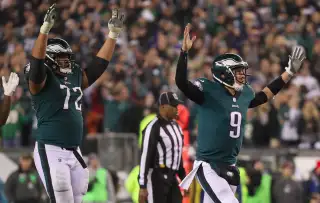Here's How Much the Eagles Could Owe in Taxes for Their Super Bowl Win

Winning the Super Bowl confers glory, prize money — and, this year, a hefty tax bill from the state of Minnesota.
The prize money NFL players earn for playing in Super Bowl LII is relatively modest, at least by the standards of professional sports salaries. Each player on the winning team — that is, the Eagles — takes home an extra $112,000 bonus, and everyone on the defeated Patriots gets an extra $56,000. This prize money is the same for everyone, from the star quarterbacks to the place kickers.
And when it comes to federal taxes, the Super Bowl winners are likely to get a break this year. The Tax Cuts and Jobs Act lowered the top marginal tax rate to 37% from 39.6%, and raised the threshold at which it kicks in to $500,000 from $426,700. The average NFL player makes about $1.9 million a year, so let's assume that most football pros are in the top tax bracket. For the Super Bowl winners, that's a tax bill of more than $41,000 on the prize money, down from what would have been about $44,000 under the old tax rules.
The Super Bowl winners will also owe state taxes, however. And that's where things get tricky.
This year's Super Bowl was played in Minnesota, which taxes wages at 9.85% — among the highest state income tax rates in the U.S.
And Minnesota taxes more than just the Super Bowl prize money. To figure how much they owe to Minnesota, the players on both teams will have to record the total number of days they work in 2018, as well as the fraction of those days that they spent working in Minnesota.
Robert Raiola, director of the sports and entertainment group at accounting firm PKF O'Connor Davies, figures that NFL players on both the Eagles and the Patriots will end up having spent seven to eight days in the Gopher State this year, including practice and playing time, out of about 230 that they'll work all year. That works out to about 3% of their total working time.
That 3% will then be applied to their entire NFL salary, with the resulting total taxed at Minnesota's hefty 9.85% rate. (Other states also tax players for their share of the time players spent in those states.)
The upshot is a tax bill that can look hefty compared to the modest (for pro sports) prize money involved. Raiola estimates that Patriots quarterback Tom Brady, who is expected to earn $15 million this year, could end up owing Minnesota roughly $43,000 — despite Sunday's loss.
Don't shed too many tears over Brady's Super Bowl tax bill, though. His overall tax burden won't change that dramatically, because the more he pays to Minnesota in 2018, the less he'll wind up paying to the other states in which he plays.
There's one final wrinkle when it comes to Super Bowl prize money, however — because the new Tax Cuts and Jobs Act will hurt NFL players in a couple of other ways. While they stand to benefit from the lower top tax rate, they will no longer be able to deduct what they pay in state taxes from their federal tax bill. They also lose the ability to deduct unreimbursed business expenses. That's a category that, for pro athletes, can include hefty costs like agent fees and union dues, Raiola says.